Sie sind sich nicht sicher, welches Material für Ihre Anwendung am besten geeignet ist?
Kontaktieren Sie einen Experten
Suche nach Material
Suche nach Anwendung
Author Archives: dean
Q: I need a fastener that can withstand frequent sterilization processes at temps to around 400F. I would prefer a polymer if possible. Also the process is pharma related, so the screws would need to be non leaching and may be exposed to low concentrations of chemicals. Any ideas? A: … Continue reading
Posted in Application, Engineered Polymer Fasteners, FAQs, High Temperature Resistance, Material, Technical Questions, Ultra Purity Tagged FDA approved bolts, FDA approved fasteners, FDA approved peek bolts, FDA approved PEEK fasteners, FDA approved PEEK screws, FDA approved screws, Hydrolysis resistant bolts, Hydrolysis resistant fasteners, Hydrolysis resistant PEEK bolts, Hydrolysis resistant PEEK fasteners, Hydrolysis resistant PEEK screws, Hydrolysis resistant screws, PEEK bolts FDA approved, PEEK bolts for Pharmaceutical purity, PEEK bolts for purity, PEEK bolts for sterilization processes, PEEK fasteners FDA approved, PEEK fasteners for Pharmaceutical purity, PEEK fasteners for purity, PEEK fasteners for sterilization processes, PEEK Screws FDA approved, PEEK screws for Pharmaceutical purity, PEEK screws for purity, PEEK screws for sterilization processes Leave a comment
Q: Hello I am researching titanium and C276 hardware for a submerged application in a high chloride (20,000 mg/L) elevated temperature environment (125F). Corrosion resistance is more important than shear or tensile strength in this application. A: Titanium screws should be a good choice for your application especially Grade 2 … Continue reading
Posted in Application, Corrosion Resistance, FAQs, High Strength, Technical Questions Tagged Hastelloy bolts for chloride and HCL corrosion, Hastelloy C276 bolts for chloride and HCL corrosion, Hastelloy C276 fasteners for chloride and HCL corrosion, Hastelloy C276 screws for chloride and HCL corrosion, Hastelloy fasteners for chloride and HCL corrosion, Hastelloy screws for chloride and HCL corrosion, Titanium bolts for chloride corrosion, Titanium fasteners for chloride corrosion, Titanium grade 2 bolts for chloride corrosion, Titanium grade 2 fasteners for chloride corrosion, Titanium grade 2 screws for chloride corrosion, Titanium screws for chloride corrosion Leave a comment
Q: I am looking for recommendations for fasteners capable of operating under load at 2000C, in a mild vacuum environment. The material can be conductive or insulating just along as it does not react with carbon. A: For temperatures as high as 2000C, Zirconia ceramic fasteners would be your only … Continue reading
Posted in Advanced Ceramic Fasteners, Application, Corrosion Resistance, FAQs, High Temperature Resistance, Technical Questions Tagged zirconia bolts for high temperature, zirconia ceramic bolts for 2000C application, zirconia ceramic bolts for high temperature, zirconia ceramic fasteners for 2000C application, zirconia ceramic fasteners for high temperature, zirconia ceramic screws for 2000C application, zirconia ceramic screws for high temperature, zirconia fasteners for 2000C application, zirconia fasteners for high temperature, zirconia screws for 2000C application, zirconia screws for high temperature Leave a comment
Q: I have an application with high temperature exhaust that requires a high strength bolt for oxidation resistance. Temps are pretty consistent around 1300F. Would Inconel 718 bolts be a good choice? A: Inconel 718 would definitely be one good option. Inconel 718 bolts offer 210ksi tensile strength and are … Continue reading
Posted in Application, FAQs, High Strength, High Temperature Resistance, Technical Questions Tagged A286 bolts for high temperatures, A286 fasteners for high temperatures, A286 screws for high temperatures, Alloy 718 bolts for high temperatures, Alloy 718 fasteners for high temperatures, Alloy 718 screws for high temperatures, Inconel 718 bolts for high temperatures, Inconel 718 fasteners for high temperatures, Inconel 718 screws for high temperatures, Nimonic 80A bolts for high temperatures, Nimonic 80A fasteners for high temperatures, Nimonic 80A screws for high temperatures, Nimonic bolts for extreme temperatures, Nimonic bolts for high temperatures, Nimonic fasteners for extreme temperatures, Nimonic fasteners for high temperatures, Nimonic screws for extreme temperatures, Nimonic screws for high temperatures Leave a comment
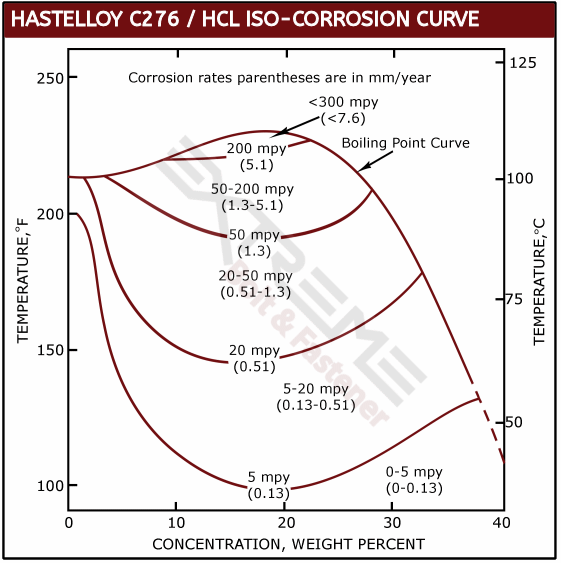 Q: I am needing to replace some hex heads and nuts on an HCL tank lid. It appears they were originally coated and due to a previous leak, they are starting to corrode. What would be the best alternative bolt type for this situation? HCL concentration is 37% and is … Continue reading
Q: I am needing to replace some hex heads and nuts on an HCL tank lid. It appears they were originally coated and due to a previous leak, they are starting to corrode. What would be the best alternative bolt type for this situation? HCL concentration is 37% and is … Continue reading
Posted in Application, Corrosion Resistance, FAQs, Material, Technical Questions Tagged Hastelloy bolts for HCl corrosion, Hastelloy bolts for hydrochloric acid corrosion, Hastelloy C276 bolts for HCl corrosion, Hastelloy C276 fasteners for HCl corrosion, Hastelloy C276 screws for HCl corrosion, Hastelloy FAsteners for HCl corrosion, hastelloy fasteners for hydrochloric acid corrosion, hastelloy screws for HCl corrosion, hastelloy screws for hydrochloric acid corrosion Leave a comment
Q: We are looking for a non-conductive screw with lower dielectric constant / dissipation factor to replace a steel screw (Tensile Strength 70kpsi) in one of our products. So were trying to get to similar strength / properties to the steel screw to meet our torque requirements. Will a ceramic … Continue reading
Posted in Advanced Ceramic Fasteners, Application, Engineered Polymer Fasteners, FAQs, Non-Conductive, Technical Questions Tagged alumina screws for Low Dielectric Constant, ceramic screws for Low Dielectric Constant, PEEK bolts for Low Dielectric Constant, PEEK fasteners for Low Dielectric Constant, PEEK glass filled bolts for Low Dielectric Constant, PEEK glass filled fasteners for Low Dielectric Constant, PEEK glass filled screws for Low Dielectric Constant, PEEK screws for Low Dielectric Constant, zirconia screws for Low Dielectric Constant Leave a comment
Q: I need a material that is resistant to a small concentration of hydrofluoric acid at room temperature? Can you offer any suggestions? A: Two materials come to mind. First in terms of metal alloys Monel 400 bolts are resistant to most concentrations of hydrofluoric acid. If you prefer a … Continue reading
Posted in Application, Corrosion Resistance, Engineered Polymer Fasteners, FAQs, Material, Technical Questions Tagged Monel 400 bolts for hydrofluoric acid corrosion, Monel 400 fasteners for hydrofluoric acid corrosion, Monel 400 screws for hydrofluoric acid corrosion, Monel bolts for hydrofluoric acid corrosion, Monel fasteners for hydrofluoric acid corrosion, Monel screws for hydrofluoric acid corrosion, PTFE bolts for hydrofluoric acid corrosion, PTFE fasteners for hydrofluoric acid corrosion, PTFE screws for hydrofluoric acid corrosion Leave a comment
Q: We are having some issues with corrosion in a highly sensitive pharma application. I need a bolt that is corrosion resistant to both acids and organics, but is usable in a high purity situation. Temperatures can reach about 120F. Also, it would need to be a polymer screw available … Continue reading
Posted in Application, Corrosion Resistance, Engineered Polymer Fasteners, FAQs, Technical Questions, Ultra Purity Tagged polymer fasteners for FDA application, polymer fasteners for pharmaceutical, polymer screws for corrosion, polymer screws for FDA, polymer screws for pharmaceutical, polymer screws for USDA application, PTFE fasteners for corrosion, PTFE fasteners for FDA application, PTFE fasteners for USDA application, PTFE screws for corrosion, PTFE screws for FDA application, ptfe screws for USDA application, PVDF fasteners for corrosion, PVDF fasteners for FDA, PVDF fasteners for high purity, PVDF for high purity, PVDF screws for corrosion, pvdf screws for FDA, PVDF screws for high purity, pvdf screws for USDA application Leave a comment
Q: How do ceramic alumina screws compare to steel screws as far as strength goes? The load would most likely be tension, but some compression too. A: If you compare 316 Stainless Steel to Zirconia ceramic screws, their tensile strengths are similar (around 75 ksi tensile) with Alumina ceramics being … Continue reading
Posted in Advanced Ceramic Fasteners, Application, FAQs, High Strength, Technical Questions Tagged alumina ceramic screw strength, alumina screws compared to stainless steel, Ceramics screws compared to stainless steel, strength of alumina ceramic screws compared to stainless steel, strength of zironia ceramic screws compared to stainless steel, zirconia ceramic screw strength, zirconia screws compared to stainless steel Leave a comment
A. We need a screw that is usable at 200C in air only, so no chemical resistance needed. I like the high strength of the Carbon Fiber PEKK or PEEK Extreme. Will these work?A Q: Would recommend using either Glass filled PEEK or Vespel. Vespel screws are made from the … Continue reading
Posted in Application, Engineered Polymer Fasteners, FAQs, High Temperature Resistance, Technical Questions Tagged glass filled peek for high temperatures, glass filled peek screws for high temperature strength, glass filled peek screws for strength, Polyimide fasteners for high temperature, Polyimide screws for high temperature, Vespel fasteners for high temperature, vespel screws for high temperature Leave a comment
Q: Looking to change to a non-conductive material for use in a high impact application. Would Alumina or Zirconia ceramic fasteners be a good fit? A: We could certainly quote you some ceramic hardware, however ceramics may not be the best non-conductive choice for a high impact environment. Ceramic fasteners … Continue reading
Posted in Application, FAQs, High Strength, Non-Conductive, Technical Questions Tagged non-conductive fasteners, non-conductive polymer fasteners, PEEK bolts for non-conductive applications, PEEK bolts for non-conductivity, PEEK fasteners for non-conductive applications, PEEK fasteners for non-conductivity, PEEK screws for non-conductive applications, PEEK screws for non-conductivity Leave a comment
Fasteners for CHLORIDE CORROSION Fighting chloride corrosion is one of the most common issues that face industrial processes. From industrial process in water treatment to pulp & paper as well as seawater applications, chlorides are very common and menace to industry. This brief newsletter shares insight into which materials for … Continue reading
Posted in Application, Blog, Corrosion Resistance Tagged AL6XN bolts for chloride corrosion, AL6XN fasteners for chloride corrosion, AL6XN screws for chloride corrosion, alloy 20 bolts for chloride corrosion, Alloy 20 fasteners for chloride corrosion, Alloy 20 screws for chloride corrosion, bolts for chloride corrosion, chloride corrosion, duplex steel bolts for chloride corrosion duplex steel screws for chloride corrosion, duplex steel for chloride corrosion duplex steel fasteners for chloride corrosion, fasteners for chloride corrosion, screws for chloride corrosion, Titanium bolts for chloride corrosion, Titanium fasteners for chloride corrosion, Titanium screws for chloride corrosion Leave a comment
Q: I have a need for a fastener for cyrogenic Helium (3.5K) application. Ideally, the fastener would be non conductive (electrically). Are any of the non conductive options you have listed good for cryo use? A: You might want to consider PTFE of PEEK fasteners. These are polymers that will … Continue reading
Posted in Application, Engineered Polymer Fasteners, FAQs, Material, Non-Conductive, Technical Questions Tagged cryogenic polymer fasteners, cryogenic polymer screws, cyrogenic polymer bolts, peek bolts for cryogenic, peek fasteners for cryogenic, peek screws for cyrogenic, ptfe bolts for cryogenic, ptfe fasteners for cryogenic, ptfe screws for cryogenic Leave a comment
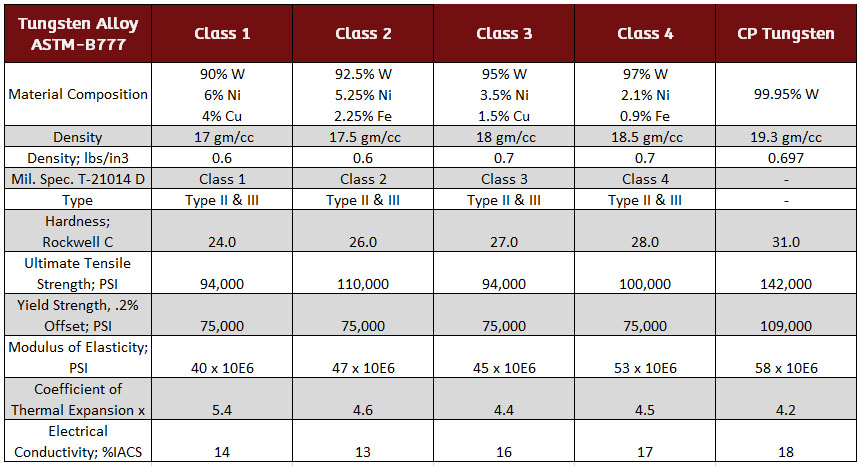 Q: I see that you list 5 different grades of Tungsten on your site, would you maybe help me choose which is the best for my application? A: There are two important differences. First, pure tungsten screws are stronger. For example 99.95% tungsten offers 142 ksi UTS vs Class 1 … Continue reading
Q: I see that you list 5 different grades of Tungsten on your site, would you maybe help me choose which is the best for my application? A: There are two important differences. First, pure tungsten screws are stronger. For example 99.95% tungsten offers 142 ksi UTS vs Class 1 … Continue reading
Posted in Application, FAQs, High Strength, Technical Questions Tagged difference between pure tungsten and alloyed tungsten, pure tungsten fasteners, pure tungsten screws, tungsten alloy fasteners, tungsten alloy screws, tungsten fasteners, tungsten fasteners for strength, tungsten screws, tungsten screws for strength Leave a comment
 PEEK, PVDF and PTFE all offer lightweight, electrical & thermal insulation and great corrosion resistance. But when it comes to strength, temperature, purity and corrosion, each has its niche. The newsletter points out which is best to use in different conditions. TEMPERATURE PEEK and PTFE screws offer excellent high temperature … Continue reading
PEEK, PVDF and PTFE all offer lightweight, electrical & thermal insulation and great corrosion resistance. But when it comes to strength, temperature, purity and corrosion, each has its niche. The newsletter points out which is best to use in different conditions. TEMPERATURE PEEK and PTFE screws offer excellent high temperature … Continue reading
Posted in Application, Blog, Corrosion Resistance, Engineered Polymer Fasteners, High Strength, High Temperature Resistance, Lightweight, Material Tagged corrosion resistant polymer bolts, corrosion resistant polymer screws, high strength polymer bolts, High strength polymer fasteners, high strength polymer screws, high temperature polymer bolts, high temperature polymer screws, high temperature resistant polymer fasteners, high temperature resistant polymer scres, polymer bolts for corrosion, polymer bolts for high temperature, polymer fasteners for corrosion, polymer screws for corrosion, Polymer screws for high temperature Leave a comment
Q: I need a bolt that can handle high temperatures and be an electric insulator? What can I use? A: That depends on what you mean by high temperature and what other issues you have like the strength requirements. If you are talking about temperatures under 500F, then you may … Continue reading
Posted in Advanced Ceramic Fasteners, Application, Engineered Polymer Fasteners, FAQs, Non-Conductive, Technical Questions Tagged Alumina fastener electric insulation, Alumina fasteners for electric insulation, Alumina screw electric insulation, Alumina screws for electric insulation, Ceramic fastener electric insulation, Ceramic screw electric insulation, PEEK bolts for electric insulation, PEEK fastener electric insulation, PEEK fasteners for electric insulation, PEEK screw electric insulation, PEEK screws for electric insulation Leave a comment
Q: I’m looking for a socket head cap screw that is 5/8″-11 x 5.5 inches in length. Need the material to be non-conductive and was thinking Ceramic Zirconia? Would that work? A: Ceramics like Zirconia screws are in fact an excellent insulator from electrical current. However zirconia ceramic fasteners are … Continue reading
Posted in Advanced Ceramic Fasteners, Engineered Polymer Fasteners, FAQs, Non-Conductive, Technical Questions Tagged ceramic bolts for electric insulation, ceramic fasteners for electric insulation, ceramic screws for electric insulation, PEEK bolts for electric insulation, PEEK fasteners for electric insulation, PEEK fasteners for insulation, PEEK screws for electric insulation, PEEK screws for insulation, zirconia bolts for electric insulation, zirconia bolts for insulation, zirconia ceramic bolts for electric insulation, zirconia ceramic fasteners for electric insulation, zirconia ceramic screws for electric insulation, zirconia fasteners for electric insulation, zirconia fasteners for insulation, zirconia screws for electric insulation, zirconia screws for insulation Leave a comment
Q: I’m looking for a polymer washer that can be used as a dielectric break between aluminum and titanium. It will also be exposed to salt water. Is torlon a good choice? A: Torlon washers will work in this situation, but there are probably more cost efficient solution for this … Continue reading
Posted in Corrosion Resistance, Engineered Polymer Fasteners, FAQs, High Temperature Resistance, Technical Questions Tagged PEEK fasteners for salt water resistance, PEEK fastners for dielectric strength, PEEK for salt water resistance, PEEK screws for dielectric strength, PEEK screws for salt water resistance, PEEK washers for dielectric strength, PEEK washers for salt water resistance, Torlon bolts for dielectric strength, Torlon fasteners for high temperature appliations, Torlon fastners for dielectric strength, Torlon screws for dielectric strength, Torlon screws for high temperature appliations, Torlon washers for dielectric strength, Torlon washers for high temperature appliations Leave a comment
Q: Since Monel is resistant to NaCl does that mean it can handle a strong chloride situation? A: Monel is resistant to chlorides but, for strong chlorides your best bet is to use Titanium screws. Titanium fasteners are almost inert to all chlorine and chloride environments due to the fact … Continue reading
Posted in Corrosion Resistance, FAQs, Material, Technical Questions Tagged titanium bolts and chloride corrosion, Titanium bolts chloride corrosion, Titanium bolts chlorine corrosion, Titanium bolts for chloride corrosion, Titanium bolts for chloride resistance, titanium fasteners and chloride corrosion, Titanium fasteners chloride corrosion, Titanium fasteners chlorine corrosion, Titanium fasteners for chloride corrosion, Titanium fasteners for chloride resistance, titanium screws and chloride corrosion, Titanium screws chloride corrosion, Titanium screws chlorine corrosion, Titanium screws for chloride corrosion, Titanium screws for chloride resistance Leave a comment
Q: I have a laboratory applications that uses about 25% sulfuric acid at room temperature to 100F. I’d like to use a polymer rather than a metal if possible. I tried PTFE screws because I thought they were corrosion resistant, but they need to be replaced often because they can’t … Continue reading
Posted in Corrosion Resistance, Engineered Polymer Fasteners, FAQs, High Temperature Resistance, Technical Questions Tagged PTFE bolts for corrosion resistance, PTFE bolts for sulfuric acid, PTFE fasteners for sulfuric acid, PTFE screws for corrosion resistance, PTFE screws for sulfuric acid, PVDF bolts for corrosion resistance, PVDF bolts for sulfuric acid, PVDF fasteners for corrosion resistance, PVDF fasteners for sulfuric acid, PVDF screws for corrosion resistance, PVDF screws for sulfuric acid Leave a comment
Q: I’m working with a process that requires a constant operating temperature of 450F. Do I need to use a metal screw or is there a polymer that can handle this? A: There are definitely polymers that can handle an environment of 450F. One option is a PEEK fastener. PEEK … Continue reading
Posted in Application, Engineered Polymer Fasteners, FAQs, High Temperature Resistance, Material, Technical Questions Tagged high temperature plastic fasteners, high temperature plastic screws, high temperature polymer fasteners, high temperature polymer screws, PEEK fasteners for high temperature, PEEK high temperature screws, PEEK screws for high temperatures, PEEK verse vespel for high temperatures, Plastic fasteners for high temperature, Plastic screws for high temperatures, Polymer fasteners for high temperature, Polymer screws for high temperature, Vespel fasteners for high temperature, Vespel screws for high temperatures, Vespel vs PEEK for high temperatures Leave a comment
I’m running some laboratory testing in a mixed acid environment and would like to use a corrosion resistant polymer as apposed to a metal. I’ve tried PEEK screws but am still struggling a bit with some acids. Is there anything better? PEEK screws provide reasonable corrosion resistance to most acids … Continue reading
Posted in Application, Corrosion Resistance, Engineered Polymer Fasteners, FAQs, Technical Questions Tagged FDA approved polymer fasteners, polymer corrosion resistant fasteners, polymer screws for acid resistance, PTFE acid resistant fasteners, PTFE acid resistant screws, PTFE corrosion resistant fasteners, PTFE corrosion resistant screws, PTFE fasteners for acid resistance, PTFE fasteners for corrosion, PTFE for corrosion, PTFE screws for acid resistance, screws for laboratory acids Leave a comment
Q: I have an application where I need a non-metal fastener because of insulation and magnetic issues. The problem is that it also needs to be able to retain strength at about 520°F. Should I use a ceramic? A: Ceramic fasteners are definitely not necessary at these temperatures, although they … Continue reading
Posted in Application, Engineered Polymer Fasteners, FAQs, High Temperature Resistance, Material, Non-Conductive, Technical Questions Tagged Torlon fasteners, Torlon fasteners for high strength, torlon fasteners for high temperature, torlon fasteners insulating properties, Torlon for high strength, torlon polymer fasteners, torlon polymer screws, Torlon Screws, Torlon screws for high strength, torlon screws for high temperture, torlon screws insulating properties Leave a comment
Q: I need a fastener that is very low weight and offers good wear resistance for a robotics application. I need about 40 ksi in strength. A: For your application I would actually suggest an engineered polymer fasteners since your strength requirement isn’t high enough to necessitate a metal . … Continue reading
Posted in Application, Engineered Polymer Fasteners, FAQs, High Temperature Resistance, Lightweight, Material, Technical Questions Tagged Fasteners for lightweight, High strength polymer fasteners, high strength polymer screws, PEEK Carbon Fiber Fastener, PEEK fastener, PEEK FAsteners for robotics, PEEK reinforced fastener, PEEK screws for lightweight, PEEK screws for Robotics, Screws for lightweight Leave a comment
Q: Can you give me a recommendation for a fastener material for a vibrating screen in a mineral processing plant which uses salt water? I’m not sure of selecting a material that combines fatigue loading strength and anti-corrosion. A: Though I don’t know the specifics of the load strength you … Continue reading
Posted in Uncategorized Leave a comment
Q: I am looking for some high tensile strength studs with good electricity resistance. I think zirconia of aluminia material will be suitable but I am open for suggestions. The studs would be about 5 inches long. A: Probably ceramics fasteners are not the best choice for this situation. It … Continue reading
Posted in Advanced Ceramic Fasteners, Application, Engineered Polymer Fasteners, FAQs, High Strength, Non-Conductive, Technical Questions Tagged non-conductive bolts, non-conductive ceramic fasteners, non-conductive fasterns, non-conductive PEEK fasteners, non-conductive polymer fasteners, non-conductive screws Leave a comment
Q: I have a question regarding a type of fastener that can handle sterilization. What I need is a polymer if possible that can handle both steam and radiation sterilization processes, but doesn’t leach into my process. Contamination is an issue. A: You can definitely use a polymer for this … Continue reading
Posted in Application, Corrosion Resistance, Engineered Polymer Fasteners, FAQs, High Temperature Resistance, Technical Questions, Ultra Purity Tagged Hydrolysis resistance, PEEK, PEEK Screws, PTFE fastener, radiation resistance, steam resistance, Sterilization process, Sterlization resistance Leave a comment
Q: I’m designing laboratory equipment that will be utilized at 325-400F and I need screws that have immunity to organics and low concentrations of acids, as well be FDA approved. Would that be a ceramic? A: You probably don’t want a ceramic screw. Though they are corrosion resistant and offer … Continue reading
Q: I am looking for a suitable fastener for use in a high heat furnace that is running at 2000F but the actual hearth wear flames go up to 3000F. The furnace is not under vacuum and has a normal atmosphere. We are finding that the 304 bolts are failing … Continue reading
Q: I’m building some lab equipment what will be housing hydrochloric acid. I need a non-metal fastener that is corrosion resistant . Can you make a recommendation? A: In terms of a material that is not metallic and can handle hydrochloric acid, I would suggest either PTFE or PVDF. PTFE … Continue reading
Q: What exactly is the difference between Titanium grade 2 and 5 fasteners? A: The primary difference is strength. A titanium grade 2 fastener is made of commercially pure titanium where as a grade 5 fastener is a titanium alloy with 6% aluminum and 4% vanadium. This helps to provide Grade 5 … Continue reading
Posted in Uncategorized Leave a comment
Q: I’ve been using Monel bolts to attach a steel platform in a seawater situation, but have experienced some mild corrosion. Not sure why and any suggestions on a better material? A: Monel is excellent in sea and salt water conditions. Two scenarios could have caused the corrosion. First, if … Continue reading
Posted in Uncategorized Leave a comment
Q: I have a load bearing application in that requires a material that can handle temperatures at plus/minus 600C? Would Titanium grade 5 work? I know it’s super strong. A: Titanium is a strong material, especially grade 5 which is half the weight and 4 times as strong as 316 steel, … Continue reading
Posted in Uncategorized Leave a comment
Q : I am looking to purchase a ceramic threaded rod, but I was curious as to its compatibility with metal. The mount I intend to use made of stainless steel; would this mate well with a ceramic rod? A: While you might be able to thread the ceramic rod into … Continue reading
Posted in Uncategorized Tagged ceramic, Stainless Steel, Thermal Expansion, Threaded rod Leave a comment
Q: I have an application where I need pan head, insulating, high vacuum compatible, screw. It will also need to be usable at a service temperature up to 150C. Do I need a ceramic? A: Though ceramics are excellent insulators, they are usually only used for high temperature applications, where … Continue reading
Posted in Advanced Ceramic Fasteners, Application, Engineered Polymer Fasteners, FAQs, Non-Conductive, Technical Questions Tagged Alumina, Insulator, PEEK, PVDF, vacuum Leave a comment
Q: I’m looking for a chemically resistant polymer that can withstand chlorine and chlorine dioxide as well as a decent amount of weight and tension (around 27 lbs of weigh). Can you suggest a material? A: Of course it depends on the concentrations and temperatures you are operating at but generally … Continue reading
Q: I’ve got in a high pressure sour gas well. We’ve been having trouble with 316 stainless steel components breaking. I need a solution but not sure what to use. A: High pressures and sour gas combined can cause cracking and corrosion in most standard stainless and alloy steels. Depending … Continue reading
Posted in Application, High Strength Tagged 17-4 PH, 17-4PH, 316, 316SS, MP35N, sour gas, Stress Corrosion Cracking Leave a comment
These two alloys are often confused as being almost the same, which is almost true. They are both nickel alloys and share many key characteristics. AL6XN and Alloy 20 are alike in that they each retain their strength to about 1000°F. In addition they both perform well, in salt water environments, … Continue reading
Posted in Blog Tagged acid resistance, AL6XN, Alloy 20, Carpenter 20, Corrosion, corrosion resistance, Nickel Alloy, Sulfuric Acid Leave a comment
Q: How does creep occur and what polymer is best to prevent this? A: Creep is the permanent deformation of the material caused by constant load or stress, usually accompanied by constant high temperature. This can result in permanent changes of the fastener shape as well weakening and fracturing of the … Continue reading
Posted in Engineered Polymer Fasteners, FAQs, High Strength, Technical Questions Tagged creep resistant, PEEK, polymers screws Leave a comment
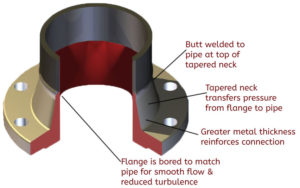 Q: I have a high pressure application with HCl at fluctuating temperatures. Can you recommend the best flange to provide a safe secure joint? A: Hands down, the weld neck flange is best for these types of hazardous, high pressure applications. Weld neck flanges are easily identified by their long … Continue reading
Q: I have a high pressure application with HCl at fluctuating temperatures. Can you recommend the best flange to provide a safe secure joint? A: Hands down, the weld neck flange is best for these types of hazardous, high pressure applications. Weld neck flanges are easily identified by their long … Continue reading
Inconel fasteners are commonly used for extreme environments and come in various “flavors” depending on the needs of the application. This brief paper will give you a quick comparison of the two most popular grades, Inconel 625 and Inconel 718 to help you choose the best material.
Q: Why does Zirconia cost more than Alumina? A: 1) Raw material cost: Aluminia is far more abundant, whereas Yttrium oxide which is a stabilizer for Zirconia ceramic, is a rare earth element. 2) Shaping costs: Due to its higher density it takes approximately 10x longer to grind down and shape … Continue reading
Q: What advantages does Zirconia have over Alumina? A: Usually for most high temperature or electric insulator applications where ceramics are needed, alumina ceramic fasteners are the most popular choice due to their properties and relatively affordable price compared to zirconia fasteners. However sometimes the extreme properties of zirconia fasteners … Continue reading
Q: Need to replace a standard steel washer with a non-conductive material. A: After speaking with this customer, I learned that he needed to replace a standard steel washer with a non-conductive material for a critical bolted joint. These washers needed to withstand 70°C temperatures while maintaining preload. He … Continue reading
Q: Can you provide alternative for a nylon pan head screw? A: Here the customer needed an alternative to nylon. Resistance to electrical fields was a primary concern. In addition, he also needed a material that had a better dissipation factor than nylon. In this situation we would recommend PEEK. It … Continue reading
Q: Need help with specific needs regarding Polyimide fasteners and their high temperature capabilities A: This Italian company was developing a new client oven. They were interested in Polyimide fasteners and their high temperature capabilities. In particular they needed: Usability to 300°C Capability with metal connections Heat and electric … Continue reading
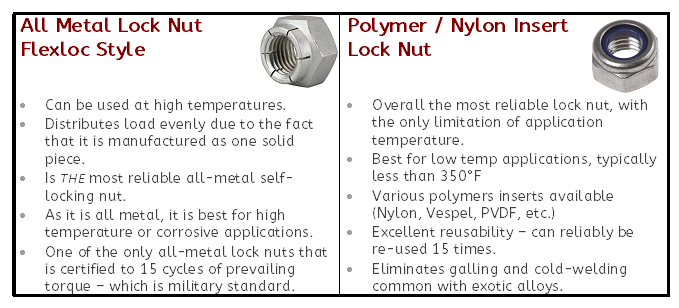 A lock nut resists loosening from vibrations and torque. Specialty material lock nuts offer the ideal solution to many extreme applications environments. They combine the unique properties of specialty materials, with the secure locking feature of a lock nut to prevent failures in the field.
A lock nut resists loosening from vibrations and torque. Specialty material lock nuts offer the ideal solution to many extreme applications environments. They combine the unique properties of specialty materials, with the secure locking feature of a lock nut to prevent failures in the field.
NASA has been designing rockets and manned space ships for over 50 years, but nothing like the innovation needed to build a light-speed, fighter spacecraft. At Extreme Bolt, we supply the aviation industry with a diversity of fasteners made from extreme materials. Though Star Wars is a fictitious story, it … Continue reading
Vacuum furnaces offer engineers a unique processing environment: high temperatures, controlled atmospheres, and rapid cooling. This low contamination environment is perfect for brazing, sintering, and heat treatment. Due to the constant extreme temperatures (typically 1,100–1,500°C), choosing the right fastener material can be a challenge. This brief paper will give you an overview on what high … Continue reading
Q: Why does Zirconia cost more than Alumina? A: 1.) Raw material cost. Alumina is far more abundant, whereas Yttrium oxide which is a stabilizer for Zirconia ceramic, is a rare earth element. 2.) Shaping costs. Due to its higher density it takes approximately 10x longer to grind down … Continue reading
Posted in Advanced Ceramic Fasteners, FAQs, High Temperature Resistance, Technical Questions Tagged Alumina, Zirconia Leave a comment
Q: Polyimide / Vespel fasteners and their high temperature capabilities A: This client is developing a new oven application and was interested in Polyimide fasteners and their high temperature capabilities. In particular they needed:
So you’ve heard the term, but what is it? Technically, it is a method in which an alloy’s structural matrix is altered on an atomic level by using temperature change to enhance the material’s mechanical properties – increasing the yield and tensile strength. Simply, it is a way to further strengthen a material. It is … Continue reading
Posted in Blog Tagged 17-4PH, age hardened, age hardening, Alloy 500, Alloy 718, I718, Inconel, Inconel 718, Inconel718, K500, M500, Monel, Monel 500, Monel500, Precipitation hardened, precipitation hardening, solution hardened, solution hardening, solutionizing, Tensile Strength, Yield Strength Leave a comment
 Tension, Not Torque Matters: How to Measure Bolt Tension In our last post, we discussed how measuring torque is an inaccurate way of getting the right bolt tension. In fact, a brand new bolt will require +/-40% torque to achieve the same tension as another new bolt out of the … Continue reading
Tension, Not Torque Matters: How to Measure Bolt Tension In our last post, we discussed how measuring torque is an inaccurate way of getting the right bolt tension. In fact, a brand new bolt will require +/-40% torque to achieve the same tension as another new bolt out of the … Continue reading
With over 30% of marine equipment failures being the result of marine corrosion, the subsequent costs have added up; now seawater corrosion costs are estimated at 4 % of the GNP. Unfortunately, sea water is not a simple medium because it is chemically and biologically active, which can have an … Continue reading
Posted in Blog Tagged AL-6XN, Monel 400, Monel K500, seawater corrosion, Titanium Grade 2 Leave a comment
 While hydrochloric acid (HCl) is a common and critical industrial chemical, it often causes significant maintenance issues for fasteners. Due to elevated temperatures, fluctuating concentrations and permeation of its vapors, utilizing the correct material for your fasteners is key to withstanding this potent acid. This article will briefly review some … Continue reading
While hydrochloric acid (HCl) is a common and critical industrial chemical, it often causes significant maintenance issues for fasteners. Due to elevated temperatures, fluctuating concentrations and permeation of its vapors, utilizing the correct material for your fasteners is key to withstanding this potent acid. This article will briefly review some … Continue reading
Posted in Blog Tagged C276, Fasteners, Hastelloy Fasteners, HCl, Hydrochloric Acid, PTFE Screws, PVDF Screws, Tantalum Fasteners, Zirconium Fasteners 2 Comments
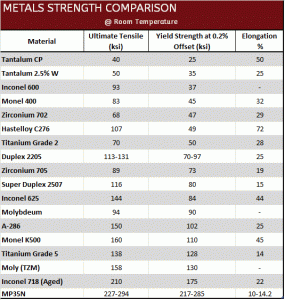 While there are many grades of stainless steel available for fasteners, we will focus on three of the highest performing grades used: Super Duplex, A-286 and 17-4PH.When comparing these materials to 316 stainless steel, their properties – of corrosion resistance, strength and high temperature stability – are significantly improved.
While there are many grades of stainless steel available for fasteners, we will focus on three of the highest performing grades used: Super Duplex, A-286 and 17-4PH.When comparing these materials to 316 stainless steel, their properties – of corrosion resistance, strength and high temperature stability – are significantly improved.
 Sulfuric Acid (H2SO4) is one of the most widely used and industrially important acids in modern society, being an essential component in the production of polymers, fuels, pharmaceuticals, electronics, and mining. While sulfuric acid is commonly used, enabling fasteners to survive in this environment is not always an easy task. To help you tackle this feat, … Continue reading
Sulfuric Acid (H2SO4) is one of the most widely used and industrially important acids in modern society, being an essential component in the production of polymers, fuels, pharmaceuticals, electronics, and mining. While sulfuric acid is commonly used, enabling fasteners to survive in this environment is not always an easy task. To help you tackle this feat, … Continue reading
Titanium fasteners are well known for their amazing combination of high strength and lightness of weight, but a lesser known characteristic of titanium is its unique corrosion resistance.
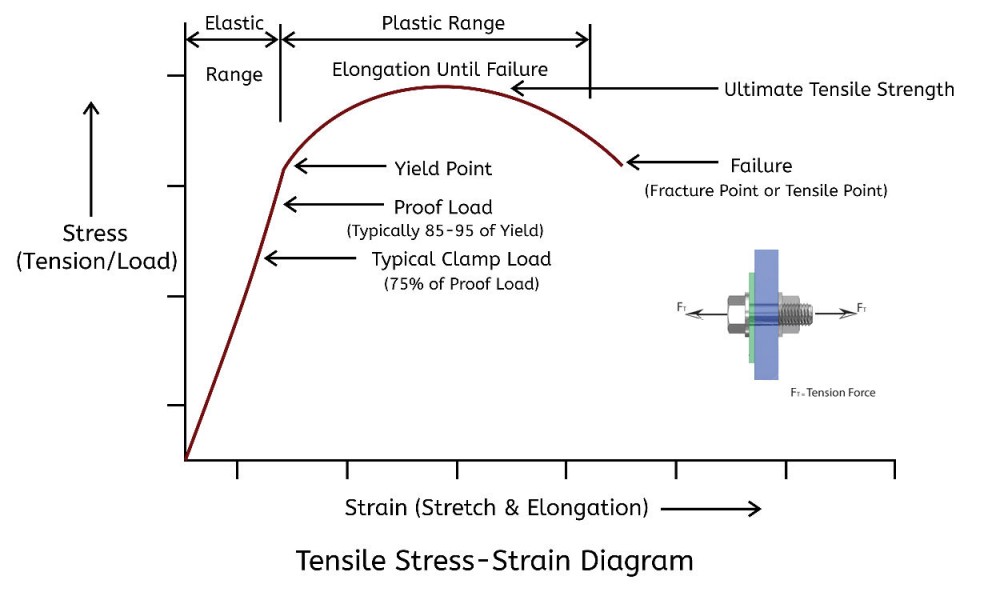 One of the most common questions we get at Extreme Bolt & Fastener is “Which material is stronger?” People instinctively would like to compare the tensile strengths of various specialty metal fasteners to get the strongest one for their application. While this may seem like a reasonable thing to do, … Continue reading
One of the most common questions we get at Extreme Bolt & Fastener is “Which material is stronger?” People instinctively would like to compare the tensile strengths of various specialty metal fasteners to get the strongest one for their application. While this may seem like a reasonable thing to do, … Continue reading
All titanium grades are not created equal…And with over 40 grades of titanium alloys available, it may be a bit overwhelming to choose the best titanium grade for your unique and challenging application. But don’t worry, we are here to help…
Posted in Blog Tagged Titanium Bolts, Titanium Fasteners, Titanium Grade 2, Titanium Grade 5, Titanium Screws Leave a comment
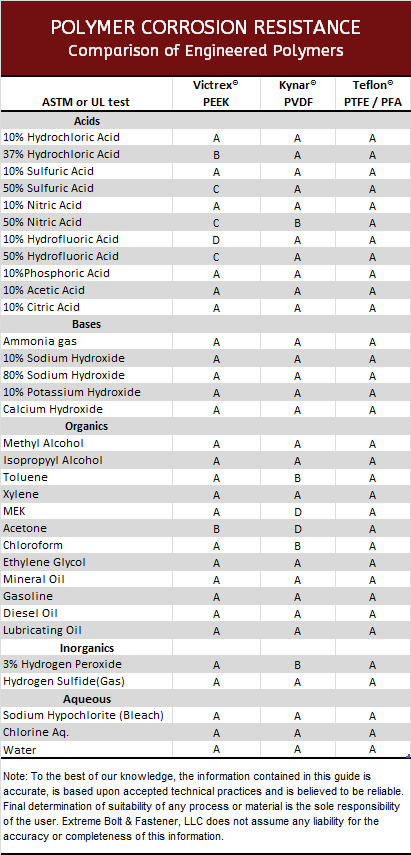 Choosing the right specialty polymer fastener for your corrosive application can be a confusing task. There are numerous material options, puzzling polymer acronyms and generally too much information. However, understanding the general chemical resistance of polymers will put you in a better position to make the best choice for your … Continue reading
Choosing the right specialty polymer fastener for your corrosive application can be a confusing task. There are numerous material options, puzzling polymer acronyms and generally too much information. However, understanding the general chemical resistance of polymers will put you in a better position to make the best choice for your … Continue reading

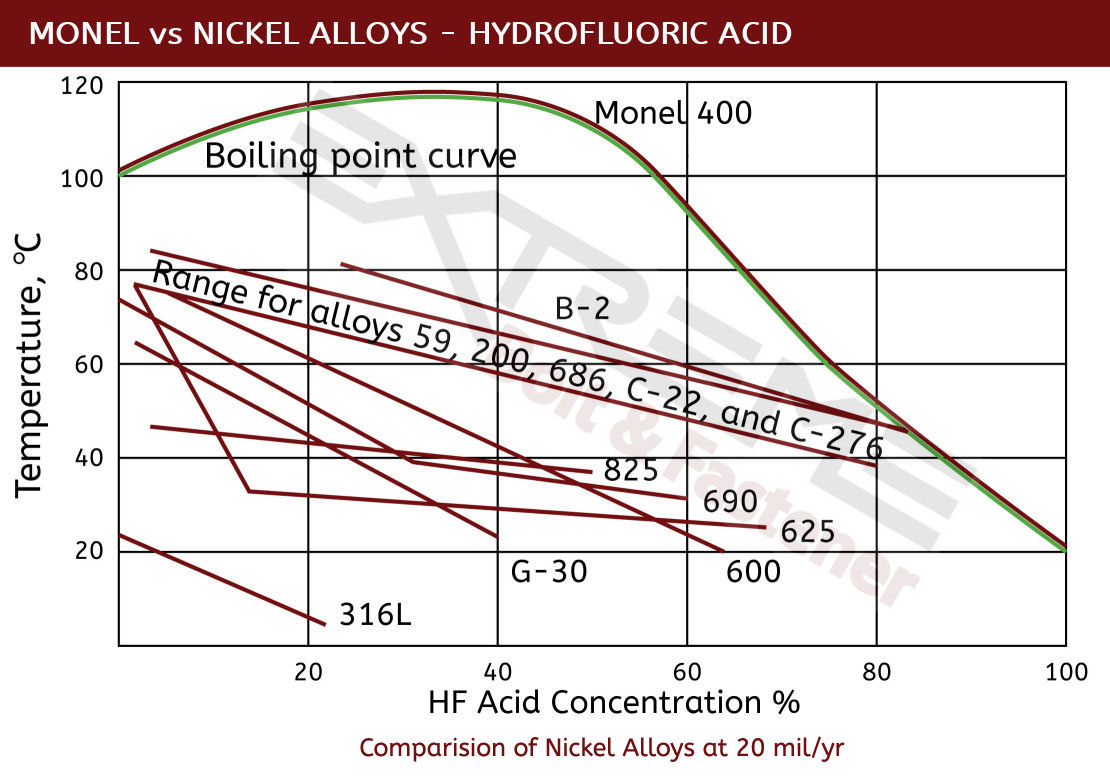 Q: Will Nickel 200 bolts be a good choice for hydrofluoric acid? A: For aqueous HF, Nickel 200 fasteners offer limited protection. If application requires a metal then you may want to consider Monel 400. Monel 400 bolts are the most resistant option for hydrofluoric acid in all concentrations up …
Q: Will Nickel 200 bolts be a good choice for hydrofluoric acid? A: For aqueous HF, Nickel 200 fasteners offer limited protection. If application requires a metal then you may want to consider Monel 400. Monel 400 bolts are the most resistant option for hydrofluoric acid in all concentrations up …  What is a refractory metal fastener? Molybdenum, tantalum, tungsten and zirconium are all refractory metals. (We are excluding titanium from this topic although it can be considered a refractory metal by certain definitions). All these refractory metal fasteners are characterized by their high-temperature melting points, but they also have other …
What is a refractory metal fastener? Molybdenum, tantalum, tungsten and zirconium are all refractory metals. (We are excluding titanium from this topic although it can be considered a refractory metal by certain definitions). All these refractory metal fasteners are characterized by their high-temperature melting points, but they also have other …  Titanium is an amazing material offering strength, lightness of weight, and corrosion resistance but there are also instances that titanium should not be used. This brief newsletter covers the do’s and don’ts of titanium screws. Do Use for Saltwater & Chloride Resistance One of the most noteworthy uses of titanium …
Titanium is an amazing material offering strength, lightness of weight, and corrosion resistance but there are also instances that titanium should not be used. This brief newsletter covers the do’s and don’ts of titanium screws. Do Use for Saltwater & Chloride Resistance One of the most noteworthy uses of titanium …  Salt water is great for swimming, but provides industry a wide range of corrosion challenges from marine vessels to desalination plants, and even off-shore oil. The good news is there are several materials that perform very well in these environments. This newsletter compares them on their salt water corrosion resistance …
Salt water is great for swimming, but provides industry a wide range of corrosion challenges from marine vessels to desalination plants, and even off-shore oil. The good news is there are several materials that perform very well in these environments. This newsletter compares them on their salt water corrosion resistance … 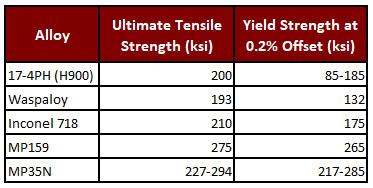 Extreme high strength fasteners made from advanced alloys allow industries such as aerospace, mining, and oil & gas to push the limits of what is possible. With requirements of ultimate tensile strengths beyond 200ksi this newsletter reviews these materials, their specific traits and niches. 17-4 PH Age hardened, 17-4PH …
Extreme high strength fasteners made from advanced alloys allow industries such as aerospace, mining, and oil & gas to push the limits of what is possible. With requirements of ultimate tensile strengths beyond 200ksi this newsletter reviews these materials, their specific traits and niches. 17-4 PH Age hardened, 17-4PH …  From thermal processing and furnace applications to the extreme demands of aerospace, several high temperature alloys are available each with unique traits and capabilities. This brief newsletter will outline the primary fastener materials that are commonly used for excellent high temperature and oxidation resistance. Best High Temperature Oxidation Resistant Fasteners …
From thermal processing and furnace applications to the extreme demands of aerospace, several high temperature alloys are available each with unique traits and capabilities. This brief newsletter will outline the primary fastener materials that are commonly used for excellent high temperature and oxidation resistance. Best High Temperature Oxidation Resistant Fasteners …  Q: I’m operating a FGD (Flue Gas Desulphurization) plant and am experiencing some mild corrosion on my scrubber bolting. I’m currently using Incoloy 825 bolts. It’s mild corrosion but non-the-less I’d like to have it cleared up before I get additional issues. Any suggestions? A: Since scrubber liquids and gases …
Q: I’m operating a FGD (Flue Gas Desulphurization) plant and am experiencing some mild corrosion on my scrubber bolting. I’m currently using Incoloy 825 bolts. It’s mild corrosion but non-the-less I’d like to have it cleared up before I get additional issues. Any suggestions? A: Since scrubber liquids and gases …  Nickel alloys are a special class of metals containing high levels of nickel (often greater than 20%). They play a key role in industry for their unique combination of high strength, corrosion resistance to harsh acids (like hydrochloric and sulfuric) and high temperature stability. This two-part newsletter will help summarize the distinct benefits of the …
Nickel alloys are a special class of metals containing high levels of nickel (often greater than 20%). They play a key role in industry for their unique combination of high strength, corrosion resistance to harsh acids (like hydrochloric and sulfuric) and high temperature stability. This two-part newsletter will help summarize the distinct benefits of the … 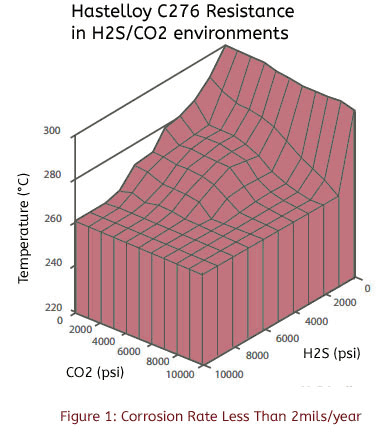 Oilfields are subjected to a diversity of corrosive elements including carbonic acids, sour gas (H2S), and fracking/stimulant acids such as hydrochloric and hydrofluoric acid. Naphthenic acids and simple organic acids are also found in crude oil extraction. In conjunction to acids, these environments contain sand and other abrasive elements which …
Oilfields are subjected to a diversity of corrosive elements including carbonic acids, sour gas (H2S), and fracking/stimulant acids such as hydrochloric and hydrofluoric acid. Naphthenic acids and simple organic acids are also found in crude oil extraction. In conjunction to acids, these environments contain sand and other abrasive elements which … 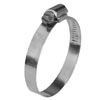 Extreme bolt offers hose clamps in Titanium and Hastelloy C276. This newsletter overviews the two styles available – worm drive and medium duty – as well as highlight what materials are best for your application. Titanium Grade 2 hose clamps are in stock and available in the sizes shown here. Hastelloy C276 hose clamps are custom made to order …
Extreme bolt offers hose clamps in Titanium and Hastelloy C276. This newsletter overviews the two styles available – worm drive and medium duty – as well as highlight what materials are best for your application. Titanium Grade 2 hose clamps are in stock and available in the sizes shown here. Hastelloy C276 hose clamps are custom made to order …  Hastelloy alloys have long been the gold standard of corrosion resistant bolts; only out performed by metals like Zirconium and Tantalum. This family of high performance nickel alloys can handle strong acids like hydrochloric, sulfuric, acetic, formic and phosphoric acids, yet each grade actually exhibits its own strengths in dealing with specific acids and niche environments. …
Hastelloy alloys have long been the gold standard of corrosion resistant bolts; only out performed by metals like Zirconium and Tantalum. This family of high performance nickel alloys can handle strong acids like hydrochloric, sulfuric, acetic, formic and phosphoric acids, yet each grade actually exhibits its own strengths in dealing with specific acids and niche environments. … 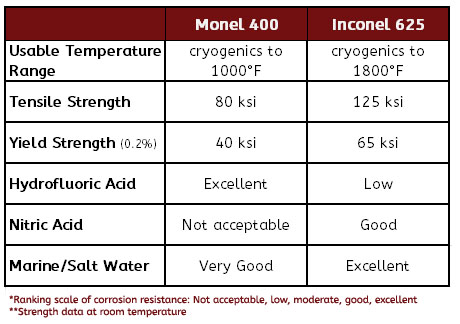 They rhyme, are both used in extreme environments, and are both nickel metal alloys, but Monel and Inconel are actually very different. But how? Let’s start with basic chemistry. Monel is a nickel-copper alloy and Inconel is a nickel-chromium alloy. So what does that mean for your extreme application? We …
They rhyme, are both used in extreme environments, and are both nickel metal alloys, but Monel and Inconel are actually very different. But how? Let’s start with basic chemistry. Monel is a nickel-copper alloy and Inconel is a nickel-chromium alloy. So what does that mean for your extreme application? We … 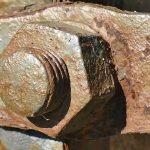 Thread galling is a common yet a seldom understood fastener problem seen by engineers and fabricators. It occurs when pressure and friction cause bolt threads to seize to the threads of a nut or tapped hole. The fasteners are not just overly tight but “cold/contact” welded together.
Thread galling is a common yet a seldom understood fastener problem seen by engineers and fabricators. It occurs when pressure and friction cause bolt threads to seize to the threads of a nut or tapped hole. The fasteners are not just overly tight but “cold/contact” welded together.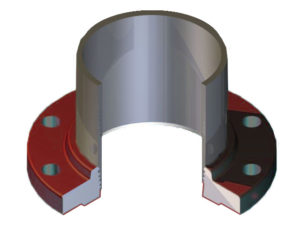 Q: When do you recommend to use a threaded flange? I need a flange that can be changed easily & frequently. A: After speaking with the customer, I found out that he has a pilot plant where he will be frequently changing parts. In this case a threaded flange is …
Q: When do you recommend to use a threaded flange? I need a flange that can be changed easily & frequently. A: After speaking with the customer, I found out that he has a pilot plant where he will be frequently changing parts. In this case a threaded flange is … 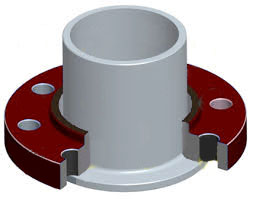 Q: When is it best to use a lap joint flange? A: Lap joint flanges are good for very expensive materials like tantalum and zirconium and other specialty alloys like Hastelloy or Inconel due to reduced cost of sleeve vs solid flange. Lap joint flanges are unique in that they …
Q: When is it best to use a lap joint flange? A: Lap joint flanges are good for very expensive materials like tantalum and zirconium and other specialty alloys like Hastelloy or Inconel due to reduced cost of sleeve vs solid flange. Lap joint flanges are unique in that they … 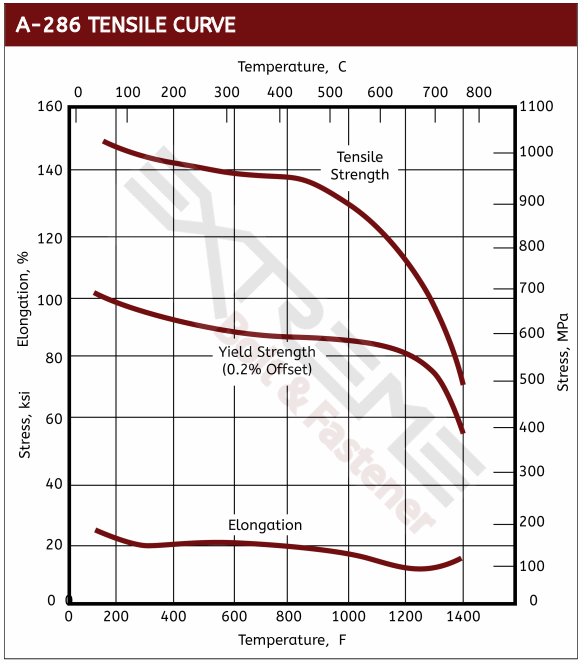 At elevated temperatures of beyond 1000°F, fasteners face a variety of complications which impact their performance. In this article, we will look at some common problems related to elevated temperatures and make recommendations of the best materials to address them.
At elevated temperatures of beyond 1000°F, fasteners face a variety of complications which impact their performance. In this article, we will look at some common problems related to elevated temperatures and make recommendations of the best materials to address them.